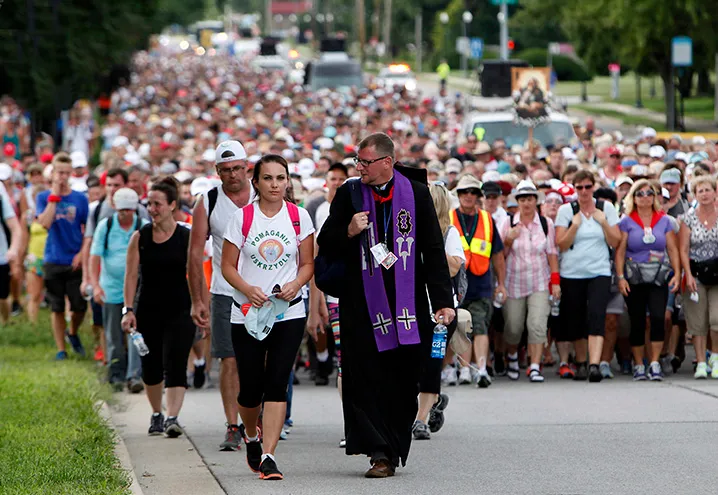
Published February 20, 2024
WWNN: You’ve worked with others, mostly behind the scenes, to write and publish important Catholic content for a lot of years. You also helped shape the lived experience of the New Evangelization, first as editor of the National Catholic Register, then as a staffer in the Archdioceses of Denver and Philadelphia, and now as an EPPC scholar. But that’s not how you started out.
Maier: I wanted to be a screenwriter, and I actually made a living at it for half a dozen years. I wrote about it in First Things awhile back for anyone who’s interested. But it’s a tough business and not a friendly environment for families, especially if you have any serious religious convictions. So I drafted the outline and a couple of chapters for a novel, got a contract and a small advance from Crown Publishers, and took a part-time copyediting job to pay the bills at the National Catholic Register, which was based in LA at the time. Six months later I was editor in chief. I did that for 15 years. I then got recruited as communications secretary for the Archdiocese of Denver, worked for Archbishop (now Cardinal) J. Francis Stafford, and then for his successor, Archbishop Charles Chaput. I served as senior aide to Archbishop Chaput in Denver and Philadelphia for 23 years. I never went back to the novel.
WWNN: Why “True Confessions” as a title?
Maier: True Confessions is one of my all-time favorite movies: It’s not a pious film, in fact pretty much the opposite; but in its own way, it’s profoundly Catholic. I also had Augustine’s Confessions in my head as I worked on the project, and the book is finally a record of faithful—clergy, religious, and laypersons—confessing Jesus Christ and his Church, each from his or her own experiences, and each for his or her own particular reasons why.
WWNN: Aside from Archbishop Chaput’s introduction and your first and last chapters, the book is largely a collection of interviews. Why write a book of interviews when you could’ve filled several volumes with your own thoughts?
Maier: I already know my own opinions. I often publish them. And candidly, I get tired of all the chattering commentators in the Church, myself included. The point of doing the book was getting to the heart of what other people actually think; people who sincerely try to live their faith but don’t have a voice. You can’t do that with a survey. You need to engage persons with conversations in depth, and you need to do it in a way that doesn’t reduce them to a data point; that reassures them about your intentions, and that you’re listening to them as individuals.
Bishops need to speak publicly with a great deal of prudence because their words can be misunderstood or deliberately twisted. So I gave the bishops I interviewed anonymity, because when a bishop feels that he can talk candidly, you get a sense of the real man, his hopes, his commitment, and his concerns. Each of those conversations was a great experience—very frank, often sobering, but in the end very encouraging—and I believe that comes through in the text. The bishops and priests I’ve known and worked around throughout my career are overwhelmingly good men, doing their best in very demanding jobs. And I’ve reread the conversations I had with parents of adopted children, and children with special needs, probably a hundred times. I don’t know where the kind of love and routine generosity I found in those couples, often in the face of very serious hardship, comes from in people. But it’s hard to be depressed about the Church and the world when you meet that sort of Christian witness.
WWNN: We hear a lot these days about the dysfunction in the Church, and yet anyone who reads True Confessions will see a different side of the story and the vitality of today’s Catholic life in our country. How is it that so much life can coexist with so much dysfunction?
Maier: It’s always been that way. We’re just bad at history. American culture is organized around a distrust, even a rejection, of the past. We’re a novus ordo seclorum, a “new order of the ages,” and remembering the past and its lessons gets in the way of reinventing ourselves here and now. To the degree that we Catholics fully assimilate into the culture, we inherit the same kind of blindness and its problems. The Church has always had a pattern of lapsing into atrophy and catastrophe, and then being restored by her saints. If we seem to be in one of her troughs, we need to remember that it can get much worse, a lot worse, than our circumstances today. Focusing too much on the dysfunction obscures the good that’s also happening. One of the pleasures in doing the book was interviewing the donors and ministry leaders, too many to count, who are doing great apostolic work. We just never hear about them because mainstream secular thought ignores them, and has no interest in recognizing them.
WWNN: Another possible title for your book might be Here Comes Everybody, since you speak with Catholics from all walks of life and all roles in the Church. And yet the real and substantial differences that define the various categories fade away in light of the common faith shared among everyone you interview. What does this say about the essence of the faith?
Maier: The different vocations, tasks, and personalities in the Church are part of her glory. They also reflect the reality of human nature and life, which the Church understands better than anyone. We’re not all “equal” in the secular, modern sense except—at least theoretically—in the matter of citizenship and law. We’re not sovereign, individual entities that can create and recreate ourselves at will. That’s delusional. We’re each a part of an on-going story. We need each other to complete each other. God made us that way. The Catholic philosopher Alasdair McIntyre describes us as “dependent rational animals.” That’s just a big way of saying that we’re thinking creatures with a free will but also a deep need to give ourselves away in love. Life isn’t finally about power. It’s about love. And I hope True Confessions succeeds in conveying how well so many faithful Catholic people do love the Church and what she teaches, and witness that love to others.
WWNN: You’ve worked in and around the Church for more than 45 years. What are the biggest changes in the Church you’ve seen over that span and what do you think it means about the future of the Church?
Maier: The sexual and technology revolutions have changed nearly everything about modern life. And the Church is still coming to grips with it. A decade ago I suggested to some friends that we were living through a “Second Reformation.” I nearly got laughed out of the room. The differences between now and 500 years ago are obvious and drastic. But that’s actually my point. We’re living through a deep “re-formation” or restructuring of how we think about ourselves and the world. Nobody’s laughing now. I don’t doubt for a minute that the Church will survive and grow, because she’s not “our” Church but God’s Church. We don’t own her. She belongs to Jesus Christ, and he doesn’t abandon his people. But that doesn’t mean the next 20 or 30 or 50 years will be easy.
WWNN: Having followed your career over the last two decades, I’ve seen firsthand how you have supported and mentored young Catholics, sometimes at the expense of your own self-interests. What responsibility do seasoned Catholics have toward young Catholics just starting a career?
Maier: We’re each here first to learn, and then to do, and finally to teach, so the mission of the Church can continue. I’ve gotten much more than I gave in writing True Confessions, because seeing firsthand the passion, faith, and candor of young and youngish Catholics in this country is exhilarating. And frankly I wish Rome did a better job in acknowledging that, because it’s an antidote to fear. So, to whatever degree people my age are “seasoned,” it’s our job to share the wisdom we have, and then help a new generation to build on it.
Francis X. Maier is a Senior Fellow in the Catholic Studies Program at the Ethics and Public Policy Center. Mr. Maier’s work focuses on the intersection of Christian faith, culture, and public life, with special attention to lay formation and action.











